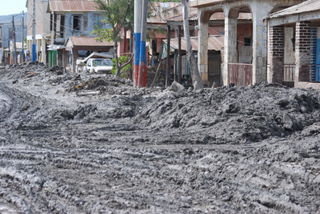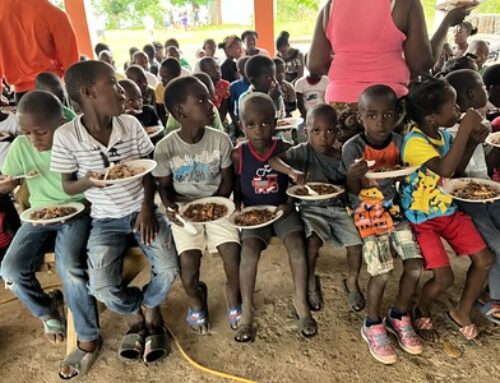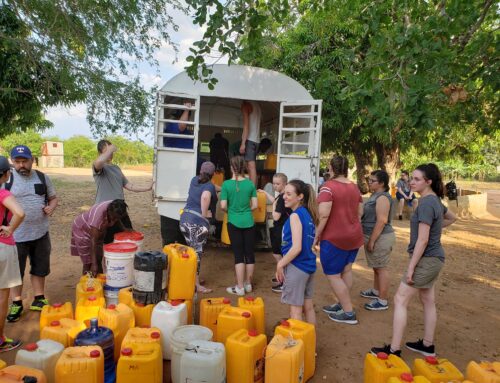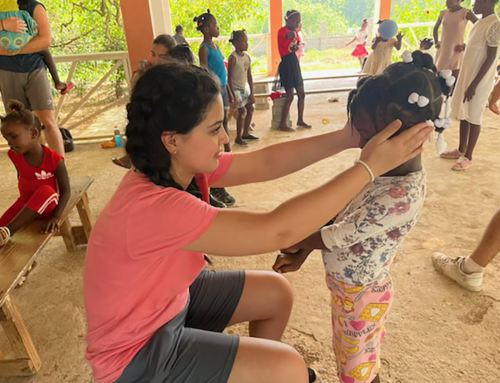January 16, 2009
Here goes. Back in October, Joseph Israel (our trusted and wonderful staff member in Haiti) and I took a tap-tap ride from Ouanaminthe to Port-au-Prince. Wow was that interesting! The most interesting part of the ride, however, was our time spent in Gonaives. 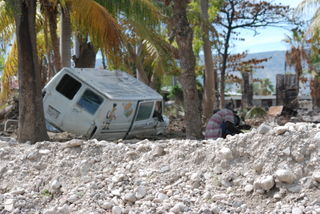 I’m sure you remember the hurricanes that devastated Haiti during the late summer and early fall. Hurricane Ike was the final blow that paralyzed Gonaives (a city of some 200,000 people) on the West coast of Haiti. Four years ago, a wall of water almost 10 feet high came crashing upon the city in the dead of night, killing an estimated 3,000 people. This time Hurricane Ike hit during daylight hours, but over 700 lives (according to Haitian news sources) were lost.
I’m sure you remember the hurricanes that devastated Haiti during the late summer and early fall. Hurricane Ike was the final blow that paralyzed Gonaives (a city of some 200,000 people) on the West coast of Haiti. Four years ago, a wall of water almost 10 feet high came crashing upon the city in the dead of night, killing an estimated 3,000 people. This time Hurricane Ike hit during daylight hours, but over 700 lives (according to Haitian news sources) were lost.
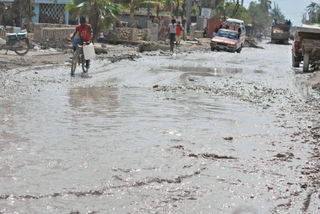 When you look at these pictures, ask yourself how anyone could live through this horror once, much less twice. Because of the critical place Gonaives is located, with three rivers converging upon the city from the denuded mountains, this will undoubtedly happen again. Joseph and I were there five weeks after Ike hit, and the city was still flooded beyond recognition. Mud (filled with everything from human body parts to every kind of debris imaginable) was still 4 feet high or more in many of the streets. On the road south of Gonaives toward St. Marc, there were still mud huts abandoned and standing in 3 or 4 feet of water. Most of the people we saw were still living on their roof tops and baling water and mud out of the bottom part of their houses. Their few earthly belongings were on top of their roofs, covered in mud. Layers of grass silt lined all the houses at about the 9 to 10 foot mark ~ a stark and horrible reminder of what had happened some 5 weeks before.
When you look at these pictures, ask yourself how anyone could live through this horror once, much less twice. Because of the critical place Gonaives is located, with three rivers converging upon the city from the denuded mountains, this will undoubtedly happen again. Joseph and I were there five weeks after Ike hit, and the city was still flooded beyond recognition. Mud (filled with everything from human body parts to every kind of debris imaginable) was still 4 feet high or more in many of the streets. On the road south of Gonaives toward St. Marc, there were still mud huts abandoned and standing in 3 or 4 feet of water. Most of the people we saw were still living on their roof tops and baling water and mud out of the bottom part of their houses. Their few earthly belongings were on top of their roofs, covered in mud. Layers of grass silt lined all the houses at about the 9 to 10 foot mark ~ a stark and horrible reminder of what had happened some 5 weeks before.
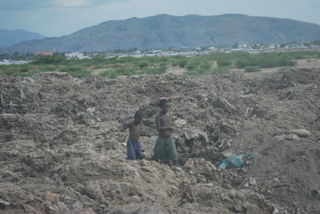 Joseph and I rode with a Haitian friend in a large dump truck through the city streets, waiting in line for front loaders to shovel huge loads of muddy garbage into the truck. We then drove to a site outside the city where hundreds upon hundreds of loads were dumped. How sad it was to see a father and 2 sons going searching through this horrible garbage in hopes of finding something valuable enough to keep!
Joseph and I rode with a Haitian friend in a large dump truck through the city streets, waiting in line for front loaders to shovel huge loads of muddy garbage into the truck. We then drove to a site outside the city where hundreds upon hundreds of loads were dumped. How sad it was to see a father and 2 sons going searching through this horrible garbage in hopes of finding something valuable enough to keep!
Such is life in Haiti. It is as though one tragedy does not have time to develop before another comes on top of it. And yet the Haitian people go on. They do so not because it is easy and not because they do not want to give up. They do so because not to do so is to give up and die. Next time you wonder why someone would chance getting in a leaky boat and brave shark-infested waters to get to the shores of America or Jamaica or Cuba or anywhere, remember to pray for Haiti.
Until next time!
Craig

